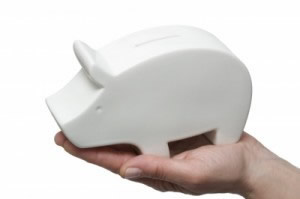Savings accounts - nest egg builders or wastes of time?
By Peter Andrew

You say tomatoes...
Do you think the Federal Reserve should be more like the Bank of England? No, I'm not suggesting it should employ people with funny accents or lose most of its international influence. But perhaps its people could learn something from their opposite numbers in London about plain speaking. The Daily Telegraph, a UK-based newspaper, reported at the end of September 2010 some remarks by the deputy governor of the Bank of England. He told British savers to, "stop moaning and start spending."
Well, that's blunt, and you can't imagine a senior Fed official coming out with anything like it. However, if you look at what the Fed does, rather than what it says, it's hard to escape the conclusion that it's trying to send a similar message to Americans. Perhaps it should just come clean like the Brits.
Saving accounts that lose you money
Partly thanks to the Fed, interest rates right now are generally at or near historic lows. That's great if you need a mortgage, but bad news if you're saving up for the down payment you'll need to get that home loan - or for anything else for that matter. Indeed, if you factor in fees and inflation, you can actually come out at a loss by keeping your money in some savings accounts.
But don't despair. It may be a long time before we again see the sorts of high rates for savers that were common a few decades ago, but a bit of research and lateral thinking could soon see you accessing yields that make saving worthwhile.
High yield savings accounts a joke?
Recently, The New York Times said that in July 2010 the average rate paid on interest-bearing deposit accounts fell to 0.99 percent. It was the first time that it had been below one percent for 60+ years. And that 0.99 percent is an average! So for every smart person earning, say, 1.7 percent annual percentage yield (APY), there's probably a sucker getting by on 0.3 percent or less.
The key point here is that just because your bank calls one of its products a "high yield savings account", that doesn't mean that the account necessarily returns a high yield. Many bankers are better at marketing than banking, and, unless you're very lucky, chances are that yours is paying a truly awful rate.
The easiest way to find a genuine high yield savings account (and, remember, that's a relative term) is to shop around for one online.
Interest-bearing checking accounts can rock
Probably the majority of banks now have interest-bearing checking accounts, and most of them are useless as savings vehicles. But shop around for long enough, and you could find some real gems. For example, one credit union has - at the time of writing - an interest-bearing checking account that's paying a rate plus dividends that comes in at better than five percent APY, though only on balances below $25,000.
It's unlikely that you'll find something as good as that, not least because you'd have to be eligible for membership of that particular credit union, and also jump through some hoops to qualify for the rate. However, there are checking accounts out there that deliver better returns than many savings accounts, money market accounts and even certificates of deposit, and it's well worth researching this market.
The downside? Well, most of them cap the balance on which high rates are paid, though usually in the tens of thousands of dollars. You're likely to need to have a high opening deposit, maintain a minimum balance, and comply with other requirements as well.
Certificates of deposit and crystal balls
Unless you're fortunate enough to find a great interest-bearing checking account, you should probably look at certificates of deposit (CDs). For most banks, these pay the highest interest rates.
So why doesn't everyone put their money in certificates of deposit? There are three main reasons:
- You invest a lump sum, so this doesn't suit those who want to put aside a little every month
- You have to tie up your savings for a set period, and pay a steep penalty if you need to make an early withdrawal
- To earn the best rates, you must be prepared to tie up that money for a long period: three, five, maybe even ten years
That last one is the killer. Suppose you were to choose a CD with a five-year term. At the moment, you might get as much as 2.75 percent APY, which is a more than respectable rate in the current market. But what happens if the economy turns around in a couple of years' time, and interest rates suddenly rocket? You're stuck with your cash tied up at 2.75 percent for another three years, while much better rates are available elsewhere.
Save anyway
Life's long and economic downturns tend to be short. Most personal finance advisers say that saving is a good habit to get into, even when rates are low. The money you put aside now could well position you to take advantage of the upturn when it arrives, or - at worst - spare you at some point in the future from the tender mercies of a collection agency.
By all means, shop around for the best rates you can find, but save anyway.
Peter Andrew has been writing about--and for--business for more than two decades. For the last couple of years, he has found himself increasingly specializing in the U.S. financial sector.
January 1, 1970 at 12:00 am